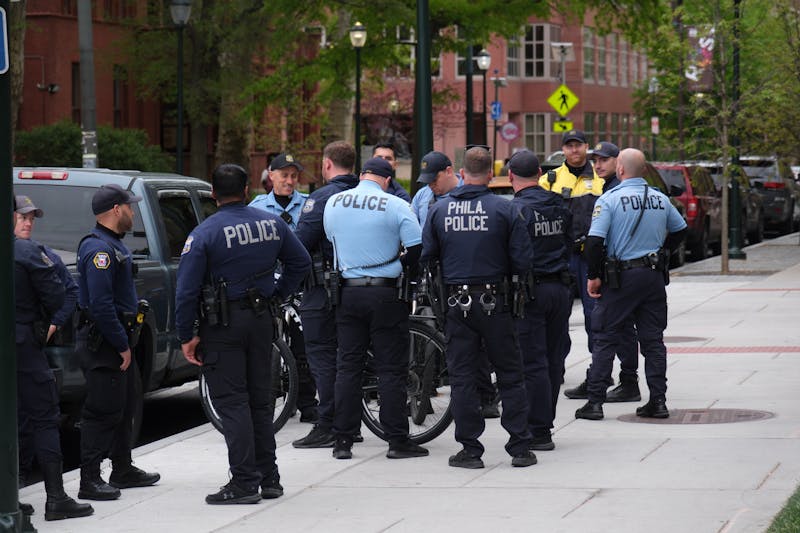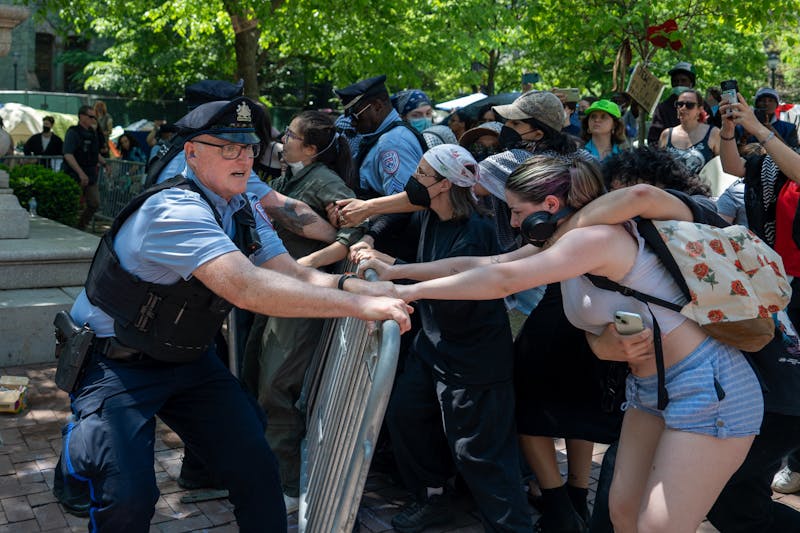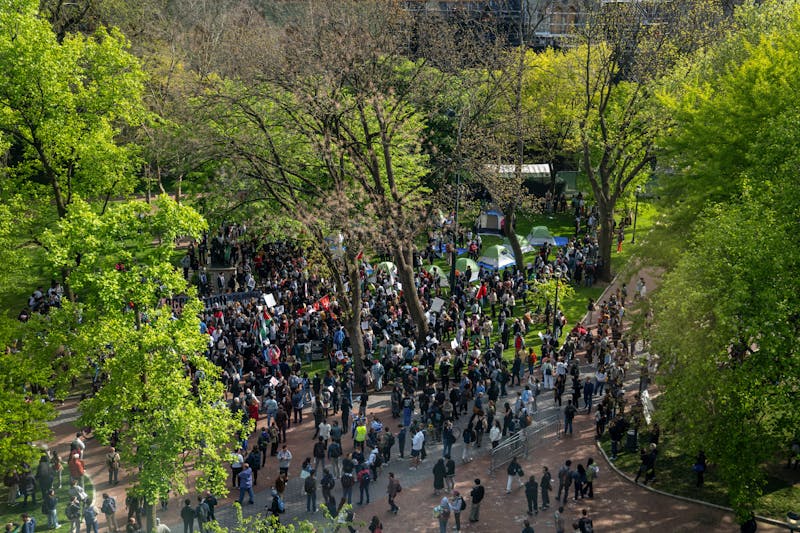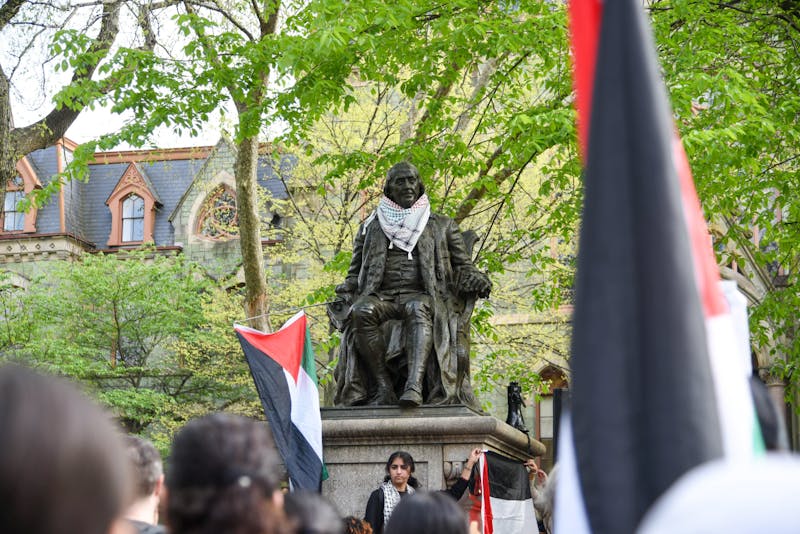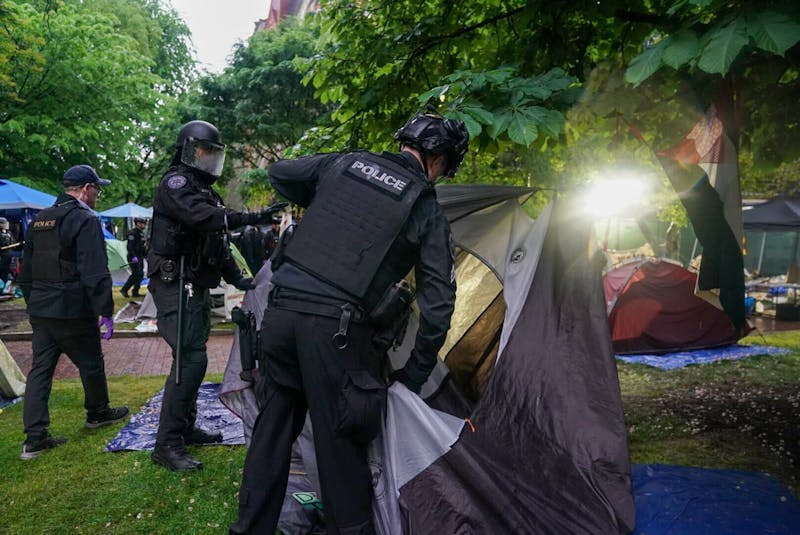
Follow live updates here, and read all of our coverage of the Gaza Solidarity Encampment and protesters’ demands here.
Penn Police officers in riot gear, with the assistance of Philadelphia Police, arrested 33 individuals at the Gaza Solidarity Encampment at around 6 a.m. on Friday.
The arrests and clearing of tents took place on the 16th day of the encampment, which began on the afternoon of April 25. Up to 40 tents took up one square of College Green until Tuesday, when at least eight tents were moved over as the encampment expanded east of the Ben Franklin statue. Penn Police officers completed arrests after about an hour, including by moving several individuals out of their tents.
At least nine students were among those arrested, according to a University spokesperson.
Police entered the encampment shortly after 6 a.m., moving barricades to enter an area where around thirty protesters, including Penn students, linked arms and surrounded the Ben Franklin statue on College Green. Protesters were removed from the statue one by one and arrested using zip tie handcuffs.
Organizers sang, “We shall not be moved” as individuals were escorted away under custody into Philadelphia Police vans. The protesters did not appear to be resisting arrest as individuals were put into custody.
"At approximately 5:30am this morning, Penn Police, with support from the Philadelphia Police Department, took steps to remove the unauthorized encampment on College Green,” a University spokesperson wrote to The Daily Pennsylvanian.
“Protestors were given multiple warnings that they were trespassing and offered the opportunity to voluntarily leave and avoid citation,” the spokesperson wrote. “Those who chose to stay did so knowing that they would be arrested and removed.”
The spokesperson added that approximately 33 individuals were arrested “without incident” and cited for defiant trespass. They said that, after searching the encampment, Penn Police found "several long lengths (6-10 feet) of heavy gauge chains, as well as smaller chains with nuts and bolts attached that could be used as weapons."
At least two protesters were sent to the hospital. The fallout of the arrests was swift — with the College Green area closing to the public, the chair of the Faculty Senate resigning as Penn faced criticism from pro-Palestinian professors, and over 150 protesters rallying outside Interim President Larry Jameson's house.

Several protesters being arrested shouted that their handcuffs were secured too tightly and they were losing feeling in their fingers.
A Penn student who was arrested alleged that her hair was pulled and that she was kneed in the face by an officer.
On Friday, after giving warnings to protesters that they were trespassing, police officers entered the encampment on both sides, breaking down tents.
Police in riot gear arrived at the encampment on bikes at 6 a.m., closing off Locust Walk and forming a border around one side of the Ben Franklin statue on College Green. A police officer repeatedly announced, “Do not resist” over a megaphone.
Officers served papers to the protesters containing a written warning of trespass, and Penn Police officers removed zip ties from metal barricades around the encampment.
"PPD, KKK, IOF they're all the same," protesters chanted.
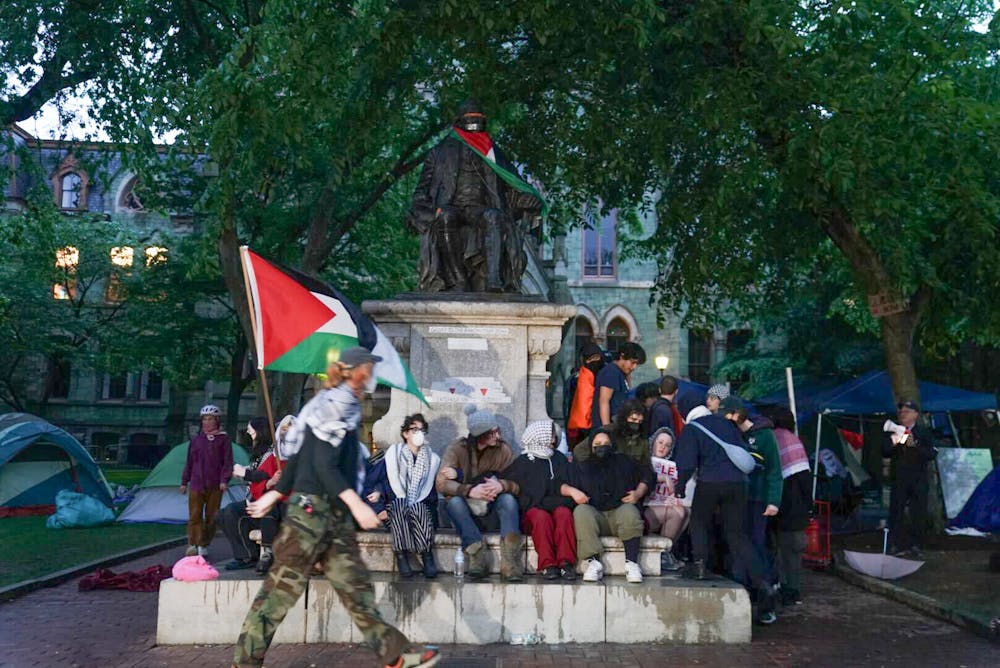
Arrested organizers were taken to a Philadelphia Police station, where all 33 people arrested were given code violation notices, not criminal charges, according to Philadelphia District Attorney Larry Krasner. The arrested protesters were released shortly after being detained.
The arrests came after Penn “requested general assistance” from the City of Philadelphia on May 1, according to a press release from 2016 Fels Institute of Government graduate and Philadelphia Mayor Cherelle Parker, Chief Public Safety Director Adam Geer, and City Solicitor Renee Garcia.
Penn Police spent three days this week receiving Civil Disorder Training from Philadelphia Police as they prepared for an event where negotiations failed, officials said. City officials added they were “thankful” that the police’s action in clearing the encampment “occurred without violence.”
“From [May 1] on, we were clear throughout that process that Philadelphia Police would provide backup assistance if arrests were made, or if the situation became dangerous or violent,” the statement wrote. “We were also clear that we expected Penn to explore every option to resolve this matter peacefully.”
Protesters followed the arrested organizers to the police station, where they led a crowd in several chants criticizing the University. Meanwhile, professors, students, and community members protested at 34th and Walnut Streets, where several faculty members were led away by police.
In multiple statements about the encampment prior to the arrests, Jameson had described the encampment as making Penn "less safe." In a message to the University community Friday, he defended the sweep and said it was necessary to return the University to a state of normalcy.
The arrests came two weeks after pro-Palestinian activists pitched approximately 40 tents on College Green, beginning a demonstration that they said would continue until their demands of the University were met. The group has demanded that Penn divest from corporations that benefit from the ongoing Israel-Hamas war, Israel’s occupation of Palestinian land, and Israeli institutions committing “scholasticide.”
Protesters also demanded that Penn defend Palestinian students, including granting amnesty to students involved in pro-Palestinian activism and reinstating Penn Students Against the Occupation of Palestine. Penn had not directly intervened to disband the encampment despite issuing multiple warnings.
Before the arrests, more than 100 police officers holding zip tie handcuffs surrounded the encampments on bikes around 6 a.m.
As they continued to host rallies and pro-Palestinian programming, encampment participants had described multiple unsuccessful negotiation meetings with Interim Penn President Larry Jameson as recently as Tuesday, while students were notified of pending disciplinary hearings for allegedly violating multiple Penn policies by camping out.

Multiple politicians, including Philadelphia District Attorney Larry Krasner, have visited the camp, either describing unfruitful attempts to meet with Penn administration or asking that the University avoid violence. The most recent round of negotiations culminated in the encampment's expansion. The University heightened security at Van Pelt Library and other campus buildings as students prepared for final exams and Penn prepared for airport-style security at Commencement.
The demonstration had remained largely peaceful. One individual with a knife holster entered a seder on April 28, and on May 1, and another individual sprayed tents and signs with an odorous substance which organizers compared to “skunk spray.”
Draped in a Keffiyeh on numerous occasions, the Ben Franklin statue was vandalized multiple times — including with graffiti that Jameson labeled as antisemitic in his initial order for the encampment to disband because of legal and policy violations.
Over the course of the encampment, there were several pro-Israeli counter protests — including a significant rally organized by Jewish students which marched to College Green on April 28. However, Penn had avoided the heightened tensions, clashes, police action, and heightened tensions seen at Columbia, the University of California at Los Angeles, and other schools across the country in recent weeks.

Encampment participants documented multiple rounds of threats and harassment from counter protesters, while the Division of Public Safety said it was investigating a video showing participants confronting a Jewish student and shining bright lights in his face. Jameson has cited protesters' experiences being "spit on, harassed, and threatened."
Petitions have circulated among alumni, donors, and community members arguing for and against the continuation of the encampment, with some stressing its peaceful nature and others alleging incidences of harassment of Jewish students or antisemitism. Meanwhile, a debate over the University’s application of the Guidelines on Open Expression has ensued, centered on criticism by Penn faculty organizations.
“I have seen and heard first-hand reports of individuals in the encampment, including students, committing acts of violence, intimidating and harassing Jewish students and faculty members, and inciting others to do the same,” College senior wrote in a legal filing.
Penn has opened disciplinary cases into at least twelve students, including placing six students on a leave of absence.
The Daily Pennsylvanian is an independent, student-run newspaper. Please consider making a donation to support the coverage that shapes the University. Your generosity ensures a future of strong journalism at Penn.
Donate




